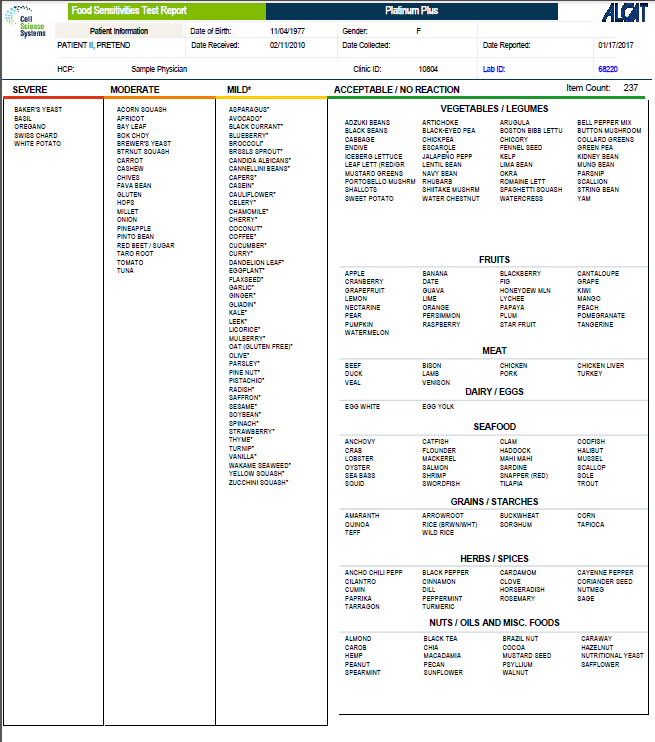Discover Which Foods Are Making You Sick
Food Sensitivities & Intolerances Are Common
What is a Food Sensitivity?
A food sensitivity or a food intolerance is caused by an inability to digest a food and occurs in the digestive tract and not the bloodstream, like a food allergy. Symptoms are “delayed onset“, where symptoms do not appear for hours or even days. Food sesntivities are not fixed, and can come and go during the course of one’s life.
Strangely, people often crave foods to which they are sensitive to. Some researchers suggest that our bodies can become addicted to the chemcial messengers, such as histamine or cortisol, which are secreted by immune cells in response to allergens in the body. The body may experience a soothing response from the presence of the chemical messengers, increasing the desire to eat more of that food.
It is important to recognize the difference between food allergy and food sensitivity. We test for the DELAYED sensitivity response…not the immediate response. We’re testing the 10-12 hour…sometimes up to 72 hour immune response that patients cannot figure out on their own!
What Are Symptoms of a Food Sensitivity?
- Headaches

- Migraines
- Fatigue
- Gas/ Bloating
- Weight Loss Resistance
- Thyroid Dysfunction
- Chronic Pain/ Inflammation
- Stomach Pain
What Causes a Food Sensitivity?
Too Much of One Food
You can become sensitive to any food you eat too often. Many people eat a relatively small number of foods several times a day. For example, wheat, a common food sensitivity, is found in breakfast cereals, breads, spaghetti, etc.
Leaky Gut Syndrome
The digestive tract plays a vital role in preventing illness and disease by providing an impenetrable barrier. When the lining of the gut is inflamed from a food sensitivity, small openings develop between the tightly woven cells making up the gut walls. This is called “leaky gut syndrome”. With leaky gut syndrome, partially digested dietary protein can cross the intestinal barrier into the bloodstream. These large protein molecules can cause an allergic response, producing symptoms directly in the intestines or throughout the body. Additionally, hundreds of yeast and bacteria are released from the gut into the bloodstream where they set up infection anywhere, including muscles, joints, bones, teeth roots, coronary arteries, or even the brain.
Deficiency of Probiotics
One of the causes of leaky gut is an absence of probiotics or “friendly” bacteria in the intestines. The friendly bacteria help maintain the health of the intestines by producing fuel for intestinal cells and killing bad bacteria. Parasitic infections, treatment with antibiotics and other toxic pharmaceuticals, stress, poor diet, smoking, alcohol and candida overgrowth can all disrupt the proper balance of friendly bacteria to bad bacteria.
Over-worked Immune System
Constant stress, exposure to air and water pollution, and pesticides and chemicals in our food puts a strain on our immune system making it less able to respond appropriately to the antigens in food.
Genetics
Food allergies and intolerances seem to be hereditary. Research indicates that if both parents have allergies, their children have a sixty-seven percent chance of developing food allergies. When only one parent is allergic, the child has a 33% chance of developing food allergies. Specifically, a person may inherit a deficiency of an enzyme like lactase, the enzyme that digests dairy. With nightshade sensitivities, there are ten genetic variants for susceptibility, not all individuals are affected equally or at all. A similar case can be made for other food sensitivities. Genetic variations predict the severity of your sensitivity.
How Food Sensitivities Can Destroy Your Health
Inflammation is one of the biggest drivers of weight gain and disease in America.Heart disease, cancer, diabetes, high cholesterol are ALL inflammatory based conditions. Food sensitivities cause systemic inflammation throughout the body, beginning in the gut. For exmaple, in people with gluten sensitivity, the immune system attacks the intestinal cells to which gluten attaches, inflaming the gut. And, when the lining of the gut is inflamed, the body is prone to even more food sensitivities and reactions, and the problem spirals out of control. The other important thing to remember is your small intestine is where you absorb your nutrients. So if you’re sensitive to gluten, this destroys your small intestine leading to nutrient deficiencies. It’s the nutrient deficiencies that can lead to a whole host of symptoms and conditions. This is one other reason why we test for deficiencies if you are indeed intolerant to gluten.
The other problem is that most people eat foods they have become sensitive to several times a day. Every time that food enters the body, the immune system whips itself into a frenzy. But because symptoms are delayed up to 72 hours after eating, a food sensitivity can be hard to spot. Without diagnosis or awareness, the damage is repeated over and over, meal after meal. Eventually, inflammation seeps throughout the body, establishing an environment ripe for weight gain and chronic disease.
What Food Testing Can Benefit
- Nutritional and health status optimization with a tailored food and supplement plan
- Women’s health; fertility, pregnancy, lactation, perimenopuase, menopause, and others
- High performance and/or severe stress
- Sports nutrition
- Pre and post surgery
- Weight management
- Burnout, fatigue, depression, mood swings, low vitality
- Chronic conditions, and/or metabolic syndrome
Here is a sample report of one of the services we use. We test a range of 50-400+ foods to determine exactly how you react.

If you think you may be sensitive to certain foods, the best thing to do is to simply test. It’s a simple finger prick done in under 3 minutes. Remember, we’re testing the delayed immune response / reaction and this makes any sort of elimination diet next to impossible. Call our clinic to today to set up a consultation to see if food sensitivity testing may be right for you.
Call To Schedule a Free Consultation »
